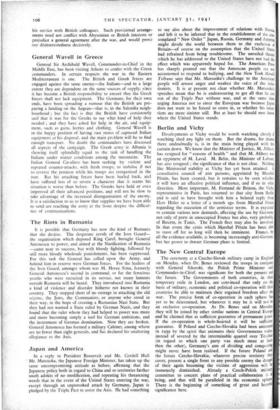The New Central Europe
The ceremony at a Czecho-Slovak military camp in England on Monday, when Dr. Benes reviewed the troops in company with General Sikorski, the Polish Prime Minister and Commander-in-Chief, was significant for both the present and the future. The Governments of both countries, in that temporary exile in London, are convinced that only on the basis of military, economic and political co-operation will thee countries be able to maintain their regained freedom after the war. The precise form of co-operation in each sphere has yet to be determined, but whatever it may be it will not be an exclusive co-operation. As Dr. Benes said on Monday, they will be joined by other similar nations in Central Europe and he claimed that as sufficient guarantee of permanent peace, If the co-operation is whole-hearted it will be sufficient guarantee. If Poland and Czecho-Slovakia had been anima in 1939 by the spirit that animates their Governments today, instead of severed by the interminable quarrel over Testhea (in regard to which one party was much more at fault than the other), Germany's aim of dividing and conquering might never have been realised. If the future Poland and the future Czecho-Slovakia, whatever precise territory the! cover, present a single front to any possible enemy the dangef of their again becoming the victims of aggression will immensely diminished. Already a Czech-Polish militar committee to concert plans of practical collaboration is being, and that will be paralleled in the economic sphere. There is the beginning of something of great and hopefd significance here.






























 Previous page
Previous page